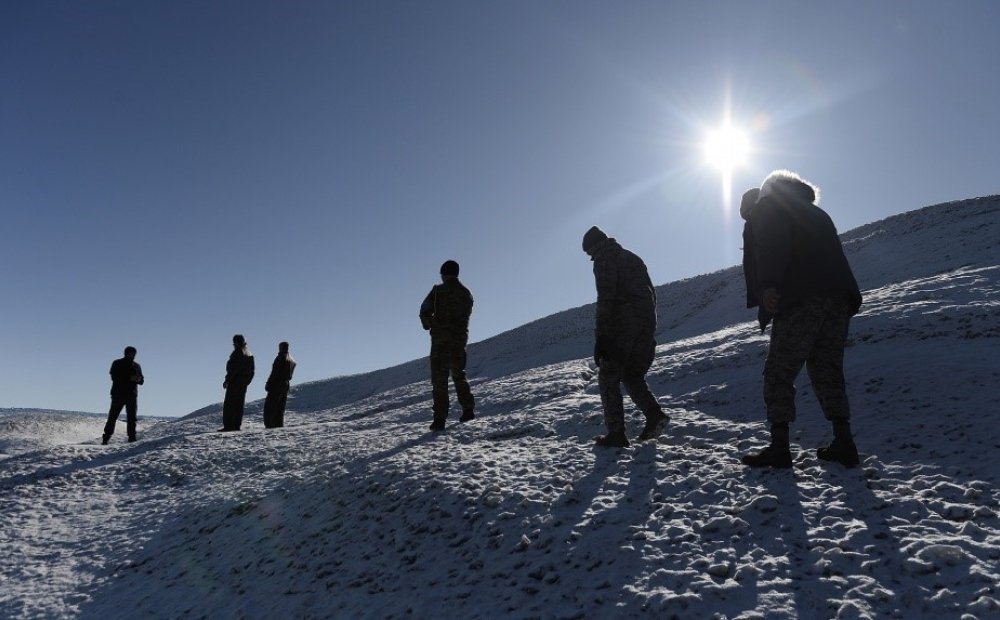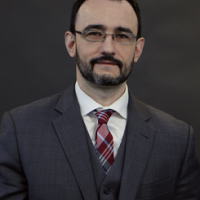Ground Truth Briefing | Russia’s Military Posture in the European Arctic

The Arctic has been widely understood by coastal states to be an area of “low tension.” However, the Arctic is not insulated from global security challenges, especially those around the impacts of climate change, and the period of Arctic exceptionalism is coming to an end. Mathieu Boulègue, Katarina Kertysova, and Michael Sfraga considered Russia’s military posture in the European Arctic and seek to explain Moscow’s military build-up in the region, Russia’s general force posture, and its impact for NATO and its allies.
SUMMARY
Following an introduction from Wilson Center CEO Jane Harman, panelists Mathieu Boulègue, Katarina Kertysova, Michael Kofman, and Michael Sfraga discussed Russia’s increased military activity in the Arctic, and its implications for broader international security. The conversation was moderated by Director of the Kennan Institute, Matthew Rojansky.
According to Mathieu Boulegue, a research fellow at Chatham House, in the Arctic “Russia is doing what Russia does best, securitizing and remilitarizing.” He stated that Russia’s key priorities in the region were, firstly, maintaining its defesce capabilities from a hypothetical U.S. strike, and secondly asserting its sovereignty over its new Arctic border in light of NATO underwater and maritime actions. Furthermore, he argued that Russia’s strategy in the Arctic is not specific to the region, but rather part of the country’s “usual assertive signalling” and performative signalling of its capabilities.
Former George F. Kennan Fellow Katarina Kertysova highlighted the economic and social dimensions of Russia’s arctic strategy. She stated that military build-up allows Russia to maintain the Northern Sea route’s commercial viability, comparing this to the U.S.’s defense of the Strait of Hormuz which is important for both American and European trade. Moreover, she highlighted that – of all the countries with a stake in the region – Russia has the largest Arctic population, but that this population has declined dramatically since 2000 leading to a strategic emphasis on reversing demographic trends and improving quality of life.
While stressing that “we [the United States] are in an adversarial relationship” with Russia in the Arctic, Global Fellow Michael Kofman stressed that Russia’s capabilities were not equal to those of America. He stated that Russia’s Arctic strategy is largely motivated by a desire to defend the country against U.S. ballistic attacks, but that this strategy is expensive and diverts funds away from other high priority security issues. On the question of whether a global recession would hamper Russia’s military build-up, he highlighted that most of the country’s defense systems are manufactured domestically and therefore relatively insulated from international shocks.
Michael Sfraga, Director of the Wilson Center's Polar Institute, gave an on-the-ground perspective on Russia’s actions from Alaska. He defined Russia’s Arctic strategy as a “layer cake of economic interests […] protected by a layer of security assets”, stating that they justify their actions by referring to threats posed by the U.S. and NATO. Like Kertysova, he highlighted the economic significance of the region, mentioning China’s billions of dollars of investment in the Russian Arctic as part of the One Belt, One Road initiative. He concluded by noting that the Svalbard region could be a zone of potential conflict due to tense rhetoric from both Norway and Russia.
Selected Quotes
Mathieu Boulegue
“Remilitarizing things is what Russia does best. Russia sees the arctic as a new challenge, because of the impact of climate change and therefore does what Russia does best, which is securitizing and militarizing things."
“Because of the impact of climate change, there is a need for increase perimeter control, because Russia sees a potential increase of NATO and US activity underwater and also in the air and on surface vessels in the region.”
Katarina Kertysova
“Russia at the moment has the largest arctic population. And since 2000, this population has declined by around 15%, with the one exception of the Yamalo-Nenets Autonomous district, all of Russia’s polar regions are expected to continue to experience a demographic decline. Military has always been the backbone of arctic development. It could be, that a part of the federal defense funds, are directed towards regional development of Russia’s arctic.”
“One of the main priorities, up to 2035, will be to improve the livelihood of Russian citizens and to provide incentives to grow the arctic population.”
Michael Kofman
“The reality is that Russian ballistic missile submarines as a force are a tiny fraction of the force of the Soviet Union originally deployed there. And most importantly the navy that used to exist to actually protect the so-called protected maritime region doesn’t really exist anymore.”
“The Russian dream was to be able to militarily create blocking zones to keep strategic US forces from being able to deploy at a certain range, and from essentially being able to strike against the Russian homeland with long-range conventional missiles.”
Michael Sfraga
“This idea of keeping tabs on having capacity for understanding better what the US and
NATO might or might not be doing in the Russia arctic, in the arctic writ large, is of significant concern to our Russian colleagues.”
“With reference to the new arctic policy signed just three weeks ago. The overlap between each of our scholars on this line and what’s in the Russian arctic policy - there are overlaps everywhere. There is a balance in that document between social responsibility, economic development, the need for infrastructure, what almost every arctic state is saying, and the absolute palpable narrative about what NATO is doing, protecting their sovereign right, if you’re from the Russian Federation, and projecting the fact that they can support and secure and defend themselves if need be and their allies.”
Speakers

Consulting Fellow, Chatham House; Non-Resident Senior Fellow, Center for European Policy Analysis

Policy Fellow, European Leadership Network (ELN)

US Ambassador-at-Large for Arctic Affairs; Former Chair, US Arctic Research Commission

Senior Fellow, Russia and Eurasia Program, Carnegie Endowment for International Peace
Moderator

President and CEO, US Russia Foundation
Hosted By

Kennan Institute
After more than 50 years as a vital part of the Wilson Center legacy, the Kennan Institute has become an independent think tank. You can find the current website for the Kennan Institute at kennaninstitute.org. Please look for future announcements about partnership activities between the Wilson Center and the Kennan Institute at Wilson Center Press Room. The Kennan Institute is the premier US center for advanced research on Eurasia and the oldest and largest regional program at the Woodrow Wilson International Center for Scholars. The Kennan Institute is committed to improving American understanding of Russia, Ukraine, Central Asia, the South Caucasus, and the surrounding region through research and exchange. Read more


Polar Institute
Since its inception in 2017, the Polar Institute has become a premier forum for discussion and policy analysis of Arctic and Antarctic issues, and is known in Washington, DC and elsewhere as the Arctic Public Square. The Institute holistically studies the central policy issues facing these regions—with an emphasis on Arctic governance, climate change, economic development, scientific research, security, and Indigenous communities—and communicates trusted analysis to policymakers and other stakeholders. Read more
